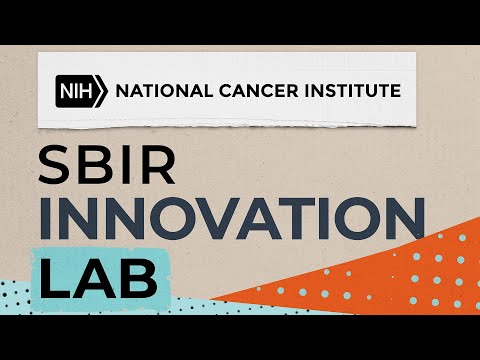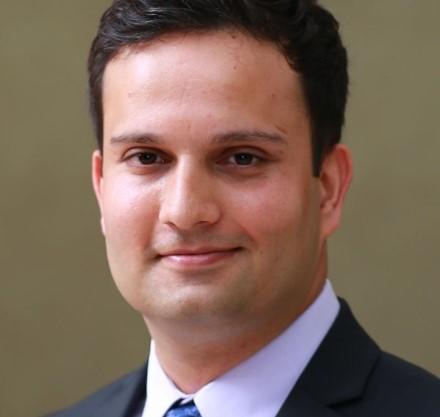Listen
Listen to this podcast to hear:
- Background into the Small Business Transition Grant’s development
- Applicant and company qualifications
- Recent program structure update and mentoring requirement
- The list of NIH institutes that offer Small Business Transition Grant
- Resources for early-stage bio innovators
- Application process and timeline
Listen on the YouTube channel.
Episode Guests
William Bozza, Ph.D.
William Bozza, Ph.D., serves as a Program Director, managing a portfolio of oncology startups (SBIR & STTR awardees) to facilitate small businesses in technology commercialization for cancer diagnosis and treatment. Dr. Bozza is currently leading the Center’s efforts on the Small Business Concept Award for early-stage high-risk/high-reward technologies that target rare and pediatric cancers. He is also taking the lead on the program’s Peer Learning and Networking Webinar Series to help SBIR companies learn from peers and facilitate collaboration.
Saroj Regmi, Ph.D.
Saroj Regmi, Ph.D., is a Program Director at the National Cancer Institute’s Small Business Innovation Research (SBIR) Development Center. In his role, he provides oversight, guidance, administers funding, as well as offers networking assistance for small businesses to accelerate the translation of cancer-related technologies.
Prior to joining the NCI, Dr. Regmi was a Program Officer at the National Institute on Aging Office of Strategic Extramural Programs (OSEP), where he led the development of entrepreneurship-focused REDI program and played a key role in planning and implementation of a suite of programs to help small businesses and early-career scientists.
Dr. Regmi conducted his postdoctoral work at NIH using CRISPR/Cas9-based approaches to study cellular processes. He received his Ph.D. in molecular and cellular biology from Dartmouth Medical School. He has received several prestigious awards and honors, including the 2019 Intramural Research Fellowship at NICHD, as well as 2021 & 2022 NIA, and NIH Director’s Awards.
Programs Mentioned in Episode
Explore the programs mentioned in this episode:
Episode Transcript
BILLY BOZZA: Hello and welcome to Innovation Lab, your go to resource for all things biotech startups, brought to you by the National Cancer Institute’s Small Business Innovation Research, SBIR Development Center. Our podcast hosts interviews with successful entrepreneurs and provides resources for small businesses looking to take their cutting edge cancer solutions from lab to market.
I'm Billy Bozza, a Program Director at NCI SBIR and today's host. Today, we'll dive into the Small Business Transition Grant, a funding opportunity designed to help early career scientists who participated in technology discovery during their academic work and are now ready to form a startup. I've invited fellow program director at NCI SBIR, Dr. Saroj Regmi to provide information on the program. Saroj, welcome to the podcast.
SAROJ REGMI: Thanks a lot, Billy. Happy to be here.
BILLY BOZZA: Saroj, I think it would be super helpful for our audience if you could provide a little context about how the Small Business Transition Grant came to be and what are some of the programmatic goals that NCI SBIR is hoping to meet with this funding mechanism?
SAROJ REGMI: Absolutely. So, Billy, I'm sure you're aware that our office thinks a lot about entrepreneurship and we all constantly think about how we can bring cancer-focused innovation to market quicker, how we can support such innovations. And so, a couple of years ago when we did a survey with NCI designated cancer centers, we found out that, you know, post-docs and early career scientists are the major drivers of entrepreneurship. They're the ones that are actually thinking about entrepreneurship, bringing their product, trying to bring their product to market.
And so, we realized that in order to successfully spin out NCI funded technologies, things that we're really funding early on through R01s and different academic grants, being able to fund that from an academic setting to universities, we really need to think about the post-doc and early career scientists, we really need to be able to empower them. And so, what that meant was we needed to create a new program where we could provide entrepreneurial training for these early career scientists. They needed mentorship as well, so we wanted to enable mentorship.
And finally, we wanted to create a separate application pool for these guys so that, you know, they would, they would be competitive in the SBIR application process. And so this program was born out of that discussion and need.
BILLY BOZZA: Great. So for our listeners who may be unfamiliar with this funding mechanism, can you explain how it works? And for those who are familiar, can you provide an update on some of the new features for the current solicitation?
SAROJ REGMI: Thanks for asking that question, Billy. So I'm really excited about this mechanism. You have to have early career scientists that have formed a company, they need to be within their ten years of their PhD, but in order to apply for any SBIR STTR grants, company formation is required. So, they need to have formed a company, and as I alluded to earlier, they need to have two mentors, someone who can guide them in regards to scientific guidance and someone who can also give them entrepreneurial advice.
For the non-aficionados here, this mechanism kind of allows for two different types of application. Phase 1 STTR with a total budget of $400,000. And what that means is that the PI of the grant, again, which is a grad student who's graduating, a post-doc, or an early career scientist, they can remain at the academic institute and apply, at least 40% of the work is now done at the start, 30% at the institution, and there's flexibility in terms of the rest of the 30%. So that's one way.
The other application that is allowed is a unique fast track mechanism where a PI can submit application for both the phase 1 and phase 2 of a project. This is sort of a three to four year grant with an award of up to $2.4 million. The first phase follows the same STTR phase 1 pathway and guidelines, but the second phase will require that the PI now is primarily employed by the small business or the startup. This is a change from last year. We allow STTR phase 1 only option along with this fast track mechanism which we've in place for a couple of years.
The other changes in alignment with SBIR STTR requirements, starting this year we welcome application from international trainees that are in the US. Obviously all the work needs to be performed in the US and all the collaboration needs to be US based, but they're eligible to apply.
And what's been great about this program is that we've had other institutes within the NIH that have joined forces with us, so NIBIB, National Institute of Biomedical Imaging and Bioengineering, NHGRI, National Human Genome Research Institute, as well as NIMH, National Institute of Mental Health, they partnered with us for this funding opportunity.
And the other thing that I wanted to highlight is that, you know, NCI is really involved in this funding opportunity. The review happens at NCI Division of Extramural Affairs. We provide entrepreneurial training for PI’s with this fantastic program called ICORE which is focused around customer discovery. And there are also a lot of other supports that's available to our funded companies.
BILLY BOZZA: This sounds like a really unique opportunity for early stage biotech innovators. So, to confirm, who should be applying for this and at what stage in their career did they need to be?
SAROJ REGMI: Another good question, yeah. So, anybody who's thinking about entrepreneurship and is within 10 years of their PhD are welcome to apply. We definitely allow applications from individuals who have completed their masters and we also allow applications from graduating PhD students as well as post-docs. If you're a non-tenure track faculty, but within 10 years of your PhD, and you're thinking about entrepreneurship, you're welcome to apply as well. But, you know, one thing to remember is that all SBIR STTR grants are awarded to institutions, not individuals, so company formation is required in order for you to apply.
BILLY BOZZA: Perfect. So if I'm an early stage entrepreneur, a PhD student, a post-doc, and I'm interested in this funding mechanism, one, how do I know if I'm eligible? And two, what is the application process look like?
SAROJ REGMI: Sure, yeah. So first and foremost, read the Notice of Funding Opportunity. You know, it's a long document, but all the critical pieces of information should be there. Definitely attend the Small Business Transition Grant webinar that's happening soon. It will be recorded and made available on the website as well. And if you have any other questions about eligibility, reach out to me, I'm happy to answer any clarifying questions and if need be, schedule a one-on-one as well.
In terms of the application process, it's going to be very similar to the other SBIR STTR application processes. Again, the critical difference being that you have to have two mentors, an entrepreneurial mentor and a business mentor.
BILLY BOZZA: Got it. So, the solicitation is currently open. Are there any important upcoming deadlines and where can listeners find out more?
SAROJ REGMI: Yeah. So the solicitation, the Notice of Funding Opportunity is being released. The deadline for the application is August 21. A letter of intent would help, so that we have a good idea of how many applications we're getting, the deadline for that is July 21st. And like I said before, you know, applicants can definitely reach out to me if they have any questions, if they want to discuss their specific aim page and if they want any other clarifying questions, I'm happy to talk.
BILLY BOZZA: Saroj, thank you so much for joining Innovation Lab. It's been a pleasure and thanks for educating us on Small Business Transition Grant.
SAROJ REGMI: Thank you very much, Billy, it's a pleasure.
BILLY BOZZA: As always, don't forget to check our website sbir.cancer.gov for the latest funding opportunities and commercialization resources to support your journey from lab to market. This was Billy Bozza from NCI SBIR. Please join us again for the next installment of NCI SBIR Innovation Lab, and subscribe today wherever you listen. If you have questions about cancer or comments about this podcast, e-mail us at nciinfo@nih.gov or call us at 800-422-6237, and please be sure to mention Innovation lab in your query.
We are our production of the US Department of Health and Human Services, National Institutes of Health, National Cancer Institute. Thanks for listening.


